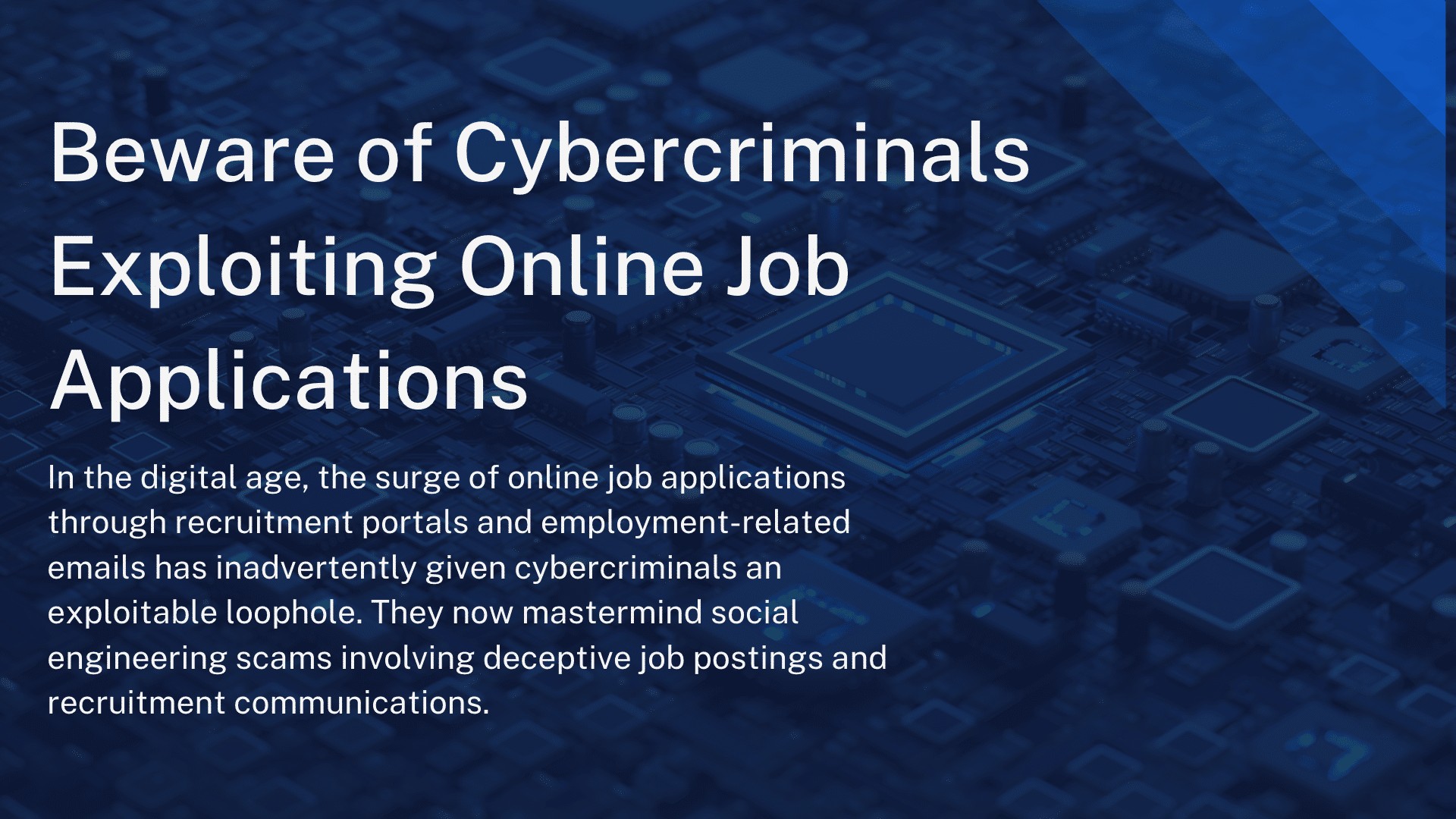-
Connect With Your Ottawa IT Service Company at (613) 828-1384
Connect With Your Ottawa IT Service Company at (613) 828-1384
The digital revolution has transformed the world in countless ways, making many facets of life more convenient and efficient. Among these is the job-hunting process, which has significantly shifted from traditional methods to online platforms. Job seekers now have many opportunities through recruitment websites and job-related emails. However, this convenience has become a breeding ground for cybercriminals, who exploit these platforms to conduct intricate social engineering scams. These scams often involve counterfeit job postings and deceptive recruitment communications, posing a serious threat to unsuspecting individuals. As part of social engineering and phishing strategies, these tactics underscore the importance of staying informed and vigilant in the digital age.
One of the most prevalent strategies cybercriminals deploy in the online job market involves creating fraudulent job advertisements. These are often posted on trusted recruitment websites such as LinkedIn, making them difficult to distinguish from legitimate listings. The process typically involves setting up anonymous accounts and crafting job listings that purport to represent genuine organizations. The postings are designed to appear authentic, enticing innocent job seekers toward potentially harmful websites. Once users land on these sites, they are prompted to divulge personally identifiable information, including their name, email address, and phone number. The ultimate goal of this scheme is to exploit this information for nefarious purposes, such as identity theft or financial fraud.

Another common tactic adopted by cybercriminals is the dissemination of bogus recruitment messages. These can be distributed via email or job recruitment platforms like LinkedIn. In this elaborate ruse, the criminals gain unauthorized access to genuine email accounts and impersonate recruiters affiliated with legitimate organizations. They then send emails or messages through job recruitment websites, skillfully imitating authentic correspondence. These misleading messages often include details about a supposed job opportunity and a link for the recipient to apply. However, once clicked, the link reroutes the individual to a malicious website designed to siphon off personal information.
In this digital battleground, you must proactively protect yourself from falling prey to these duplicitous job offer scams. Here are some recommendations:
By arming yourself with this knowledge and adopting these precautions, you can significantly reduce the risk of becoming a victim of fraudulent job offer scams. Remember, vigilance and discernment are your strongest weapons when navigating the online job market.
In this rapidly evolving digital world, cybercriminals are becoming increasingly sophisticated in their tactics. The rise in counterfeit job postings and fraudulent recruitment messages serves as a stark reminder of the potential dangers lurking in the online job market. However, by understanding the strategies employed by these criminals and adhering to the guidelines discussed above, you can confidently and safely navigate the online job application process. Remember, information is power in the battle against cybercrime, and vigilance is your best defense.
In essence, while offering convenience and efficiency, the digital age also presents its own challenges. The increasing prevalence of counterfeit job postings and deceptive recruitment messages highlights the darker side of the digital revolution. But, equipped with the right knowledge and a vigilant approach, you can effectively safeguard yourself against these threats.
The best defense against these cyber threats is to stay informed about the latest scams and their modus operandi. Regularly updating yourself about the evolving tactics of cybercriminals will help you spot any red flags when browsing job listings or reading recruitment messages.
Moreover, make it a habit to independently verify the authenticity of the job listing and the organization. Don’t rely solely on the information provided on the job portal or in the recruitment email. A quick search on the internet or a direct visit to the company’s official website can go a long way in confirming the legitimacy of the job offer.
Finally, remember to trust your instincts. It probably isn’t if something about a job listing or a recruitment message doesn’t feel right. It’s always better to be safe than sorry when protecting your personal information.
As we continue to embrace the convenience of online job applications, it’s essential to balance leveraging these digital resources and maintaining a high level of security awareness. You can navigate the digital job market confidently and securely by staying vigilant, verifying sources, and practicing safe online habits.
Remember, your personal safety and data security are paramount, and staying vigilant in the face of evolving cyber threats is the key to a safe online job hunting experience.